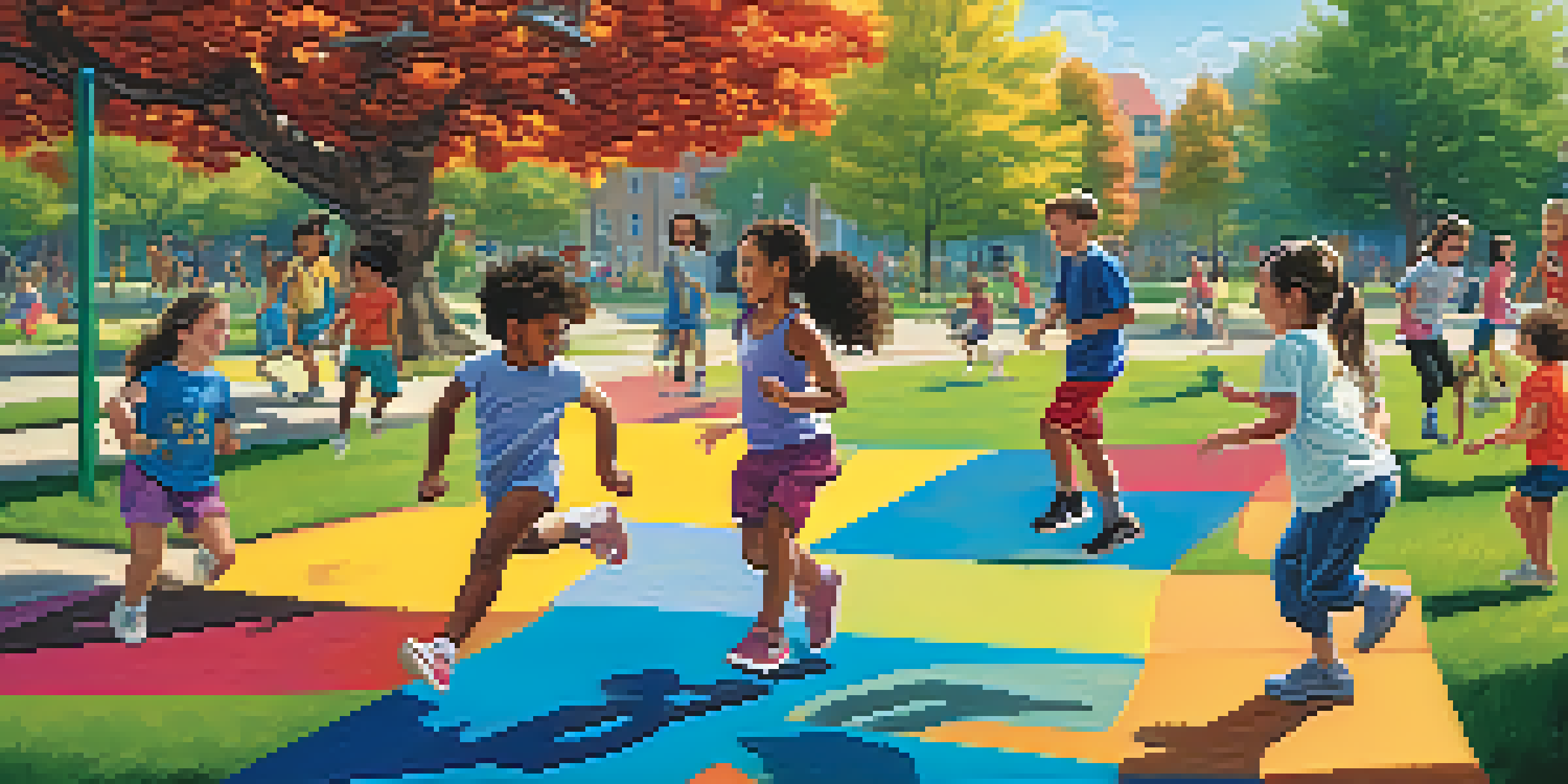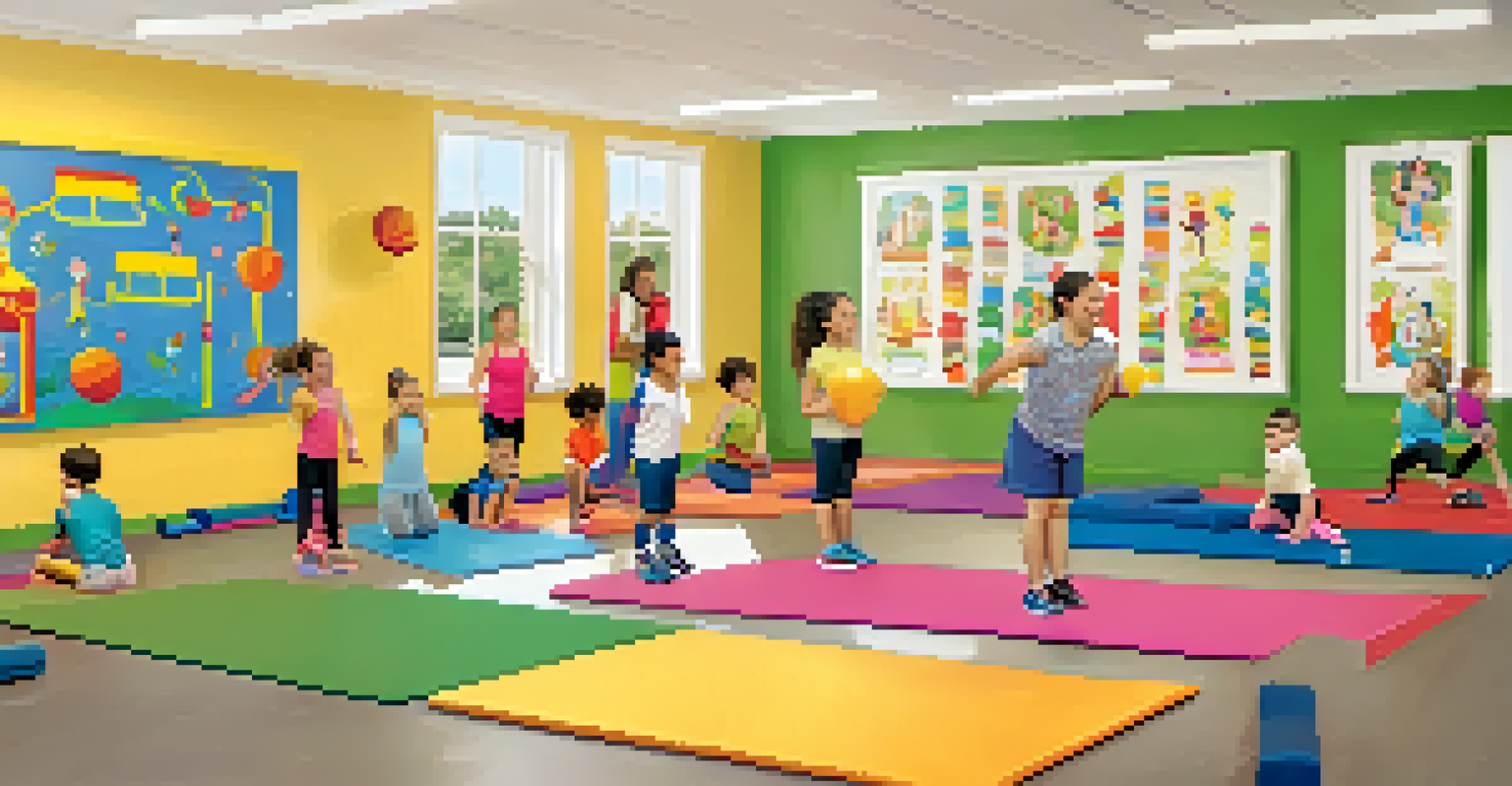Fitness Education for Kids: Teaching Bodybuilding Basics

Why Fitness Education is Essential for Kids
Fitness education lays the groundwork for a healthy lifestyle, instilling habits that can last a lifetime. By introducing kids to physical activity early, we help them understand the importance of exercise and nutrition. This knowledge not only boosts their physical well-being but also enhances their mental health and self-esteem.
Physical fitness is not only one of the most important keys to a healthy body, it is the basis of dynamic and creative intellectual activity.
Moreover, when kids learn about fitness, they become more empowered to make healthy choices. They gain confidence in their bodies, which can lead to better performance in sports and other physical activities. Understanding fitness also encourages teamwork and social skills as they often work out in groups.
Incorporating fitness education into children's routines can prevent sedentary behavior, which is increasingly common in today's digital age. By engaging them in fun and interactive ways, such as bodybuilding basics, we can capture their interest and inspire them to stay active.
Introducing Bodybuilding: A Gentle Approach
When we think of bodybuilding, we often picture intense workouts and heavy weights, but it doesn't have to be that way for kids. Introducing bodybuilding should be about learning proper techniques and building a strong foundation. Focusing on bodyweight exercises, like push-ups and squats, can be a great starting point for young learners.

The aim is to foster a positive relationship with fitness rather than pushing for competition or extreme results. This gentle approach helps kids enjoy the process, making them more likely to stick with it. It’s all about teaching them that fitness can be fun and rewarding.
Fitness Education Builds Healthy Habits
Introducing fitness education early helps kids develop lifelong habits of exercise and nutrition.
Using playful activities and games can make bodybuilding basics more engaging. For instance, turning exercises into a fun challenge or incorporating music can keep children motivated and excited to participate.
Key Bodybuilding Exercises for Kids
When teaching bodybuilding basics to kids, it's important to focus on exercises that are safe and effective. Bodyweight exercises, such as lunges, push-ups, and planks, are excellent choices. These not only help build strength but also improve flexibility and coordination, making them perfect for growing bodies.
The greatest gift you can give your children is your time and attention, especially when it comes to their health and fitness.
Additionally, incorporating resistance bands can add variety and challenge without the risk of injury associated with heavy weights. Kids can learn to perform exercises like rows and chest presses, which can be both fun and beneficial. Always emphasize proper form to prevent injuries and promote effective workouts.
Finally, don’t forget about the importance of rest and recovery. Kids should learn that their bodies need time to recover after workouts, which is crucial for muscle growth and overall health. Teaching them about rest can help instill the idea that fitness is a balanced lifestyle.
The Role of Nutrition in Fitness Education
Nutrition plays a pivotal role in fitness education, especially for kids engaging in bodybuilding. Teaching children about healthy eating habits can significantly impact their physical development and performance. It's important to explain the benefits of consuming a variety of foods, including fruits, vegetables, lean proteins, and whole grains.
By making nutrition fun and interactive, such as through cooking classes or garden activities, kids can learn to appreciate healthy foods. This hands-on approach not only educates them about what to eat but also encourages them to make healthier choices independently.
Gentle Bodybuilding Encourages Growth
A gentle approach to bodybuilding focuses on proper techniques and fun activities, fostering a positive relationship with fitness.
Moreover, understanding hydration is equally crucial. Teaching kids the importance of drinking water before, during, and after exercise can help them develop good hydration habits. When they connect nutrition and hydration with their fitness routines, they’ll be more likely to maintain a balanced lifestyle.
Setting Realistic Goals for Young Bodybuilders
Setting realistic goals is critical in fitness education for kids. This process helps children understand that progress takes time and effort. Encouraging them to set achievable fitness goals, such as completing a certain number of push-ups or running a particular distance, can boost their motivation and self-esteem.
Celebrating small victories along the way can also make the journey more enjoyable. Recognizing their accomplishments, no matter how minor, reinforces their commitment and encourages them to keep striving for more. It's important to remind them that everyone's fitness journey is unique.
Moreover, teaching kids to track their progress can be a fun activity. Whether through a simple chart or a fitness app designed for children, this practice can help them stay engaged and focused. Learning to set and achieve goals fosters a sense of responsibility and dedication that can extend beyond fitness.
Creating a Supportive Fitness Environment
A supportive environment is crucial for kids embarking on their bodybuilding journey. Parents, coaches, and educators play a vital role in encouraging children to stay active and engaged. By creating a positive atmosphere where fitness is celebrated, children will feel more comfortable exploring their abilities.
Involving peers in fitness activities can also enhance motivation. Group workouts or fitness challenges among friends can make exercise feel more like fun rather than a chore. This camaraderie can help kids develop friendships and social skills while fostering a love for fitness.
Supportive Environments Enhance Fitness
Creating a supportive and inclusive fitness environment encourages kids to engage in physical activity and develop social skills.
Additionally, it’s essential to promote inclusivity in fitness activities. Ensuring that every child feels welcome and valued, regardless of their fitness level, helps cultivate a sense of belonging. This support can empower them to explore bodybuilding and fitness without fear of judgment.
Encouraging Lifelong Fitness Habits
The ultimate goal of fitness education for kids is to instill lifelong habits. By introducing them to bodybuilding basics early, we set the stage for a healthier future. Encouraging regular physical activity and healthy eating can lead to a lifelong appreciation for fitness.
To reinforce these habits, it's essential to model a healthy lifestyle ourselves. When kids see their parents or guardians engaging in fitness and making nutritious choices, they're more likely to follow suit. This shared experience can create a supportive family dynamic focused on health and wellness.

Finally, keeping the conversation about fitness open and ongoing is vital. As children grow, their interests may change, and so should their fitness routines. By encouraging them to explore different activities, from martial arts to dance, we help them remain active and engaged throughout their lives.